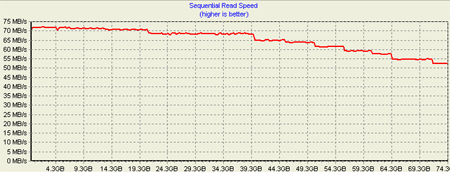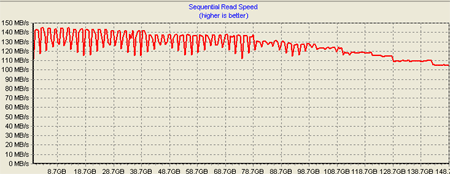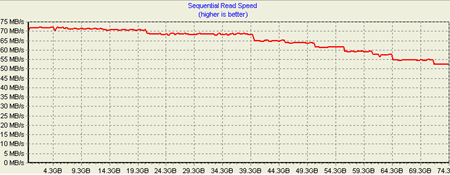HD Tach is a physical performance hard drive test for Windows 95/98/ME and Windows
NT/2000. In Windows 9X/ME it uses a special kernel mode VXD to get maximum
accuracy by bypassing the file system. A similar mechanism is used in Windows
NT/2000/XP. HD Tach reads from areas all over the hard drive and reports an
average speed. It also logs the read speeds to a text file that you can load
into a spreadsheet and graph to visually read the results of the test.
|
Hard Drive Tach 3.0.1.0 -
Benchmark Results |
|
Physical Drive Size |
Access Time |
Read Burst Speed |
Read Speed Max |
Read Speed Min |
Read
speed Avg |
CPU
utilization |
| Western Digital Raptor WD740
(single) |
74GB |
13.8ms |
121.7 |
72 |
53 |
65.1 |
4% |
| Western Digital Raptor WD740 (RAID
0) |
140GB |
7.8ms |
212.1 |
145 |
105 |
126.5 |
4% |
| Western Digital Raptor WD740 (RAID
1) |
74GB |
7.8ms |
121.6 |
72 |
52 |
65.1 |
4% |
| Seagate Barracuda ST380013AS (single) |
80GB |
12.8 |
91.1 |
59 |
31 |
47.2 |
2% |
| Seagate Barracuda ST380013AS (RAID0) |
160GB |
12.5 |
112.1 |
110 |
61 |
84.9 |
4% |
| Seagate Barracuda ST380013AS (RAID1) |
80GB |
12.7 |
91.5 |
58 |
31 |
47.2 |
4% |
|
Units: |
|
ms |
MB/s |
MB/s |
MB/s |
MB/s |
% |
Transfer Graph: Single Raptor
WD740

Transfer Graph: Dual Raptor WD740
RAID 0 Stripe

Transfer Graph: Dual Raptor WD740
RAID 1 Mirror

Like Sandra, HDTach does not see a performance difference between lone and
Mirrored RAID 1 drive configuration. The lone WD740 Raptor averages a 65.1MB/s
sustained data read, which is great. This benchmark is overly kind to
striped RAID 0 sets as opposed to single drives, so I would not expect to see a
real-life 50% performance advantage from striping. Still the numbers for
the Western Digital drives continue to be impressive.
